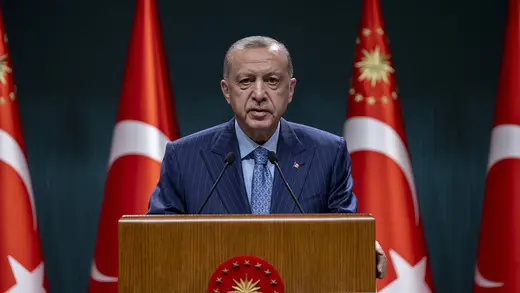What Erdogan’s Struggles Mean for U.S.-Turkey Relations
An imprisoned opponent, dire economic conditions, and ongoing tensions with the United States all pose challenges to President Erdogan’s increasingly erratic leadership.
By experts and staff
- Published
Experts
![]() By Steven A. CookEni Enrico Mattei Senior Fellow for Middle East and Africa Studies
By Steven A. CookEni Enrico Mattei Senior Fellow for Middle East and Africa Studies
What provoked Turkish President Recep Tayyip Erdogan’s recent threat to expel ten ambassadors?
Erdogan objected to a statement that the U.S. and nine other Western ambassadors made in support of Osman Kavala, a Turkish businessman and philanthropist who has been jailed in Turkey for four years while awaiting trial for charges alleging his involvement in espionage, terrorism, and attempts to overthrow the government. The allegations are absurd and Kavala’s lengthy pretrial detention underscores how far the Turkish justice system deviates from international standards.
The crisis was averted on October 25, when the U.S. and other embassies coordinated a statement indicating that they respect Turkish law and “are committed to Article 41 of the Vienna Convention on Non-Interference in the Internal Affairs of Countries.” This was sufficient for Erdogan to claim victory. The ambassadors in question will now be able to remain in Turkey.
Will this episode further damage U.S.-Turkey relations?
The threat to expel the ambassadors comes at a critical time in U.S.-Turkey relations. President Erdogan was unhappy that he did not meet with U.S. President Joe Biden during the recent UN General Assembly, and in an interview on Face the Nation, Erdogan suggested that he and Biden are not on good terms. He also implied that he is prepared to purchase additional S-400 air defense batteries from Russia. If this were to happen, Turkey’s relations with the United States and North Atlantic Treaty Organization (NATO) would be in jeopardy.
The Turkish Air Force would also like the United States to sell it forty new F-16s and upgrade kits for another eighty of the jets. The deal would essentially compensate Turkey for the $1.4 billion it spent on the F-35 Joint Strike Fighters it has been blocked from buying over the S-400 issue. Ankara has squandered a significant amount of good will in Washington, especially with the purchase of the S-400. As a result, it seems unlikely that members of Congress would be willing to approve the sale of F-16s to Turkey. In a recent letter to Secretary of State Antony Blinken opposing the proposed sale, a bipartisan group of House members stated: “The Erdogan government has made it clear that it has no intention of coming into compliance with U.S. law or dealing with the underlying conditions that led to Turkey’s ejection from the F-35 program and Congressional holds on purchases of American weapons by Turkey.” Clearly, Turkey’s acquisition of the S-400 does not just pose a problem for its acquisition of the F-35s but of American weapons more broadly. Turkey’s inventory of American weapons is extensive and includes over two hundred F-16s, upgraded M60 and M48 main battle tanks, Black Hawk and Cobra helicopters, air-to-air missiles, precision-guided munitions, mortars, armored personnel carriers, naval guns, and modernized frigates.
Also, the entity that would be acquiring the F-16s for Turkey, the Presidency of Defense Industries, or SSB, is sanctioned under the Countering America’s Adversaries Through Sanctions Act (CAATSA). Turkish officials argue that there are ways of transferring the planes to Turkey without dealing with the SSB, but members of Congress have indicated they would block any such alternatives because they would constitute an effort to circumvent U.S. law.

Added to these issues is continued tension about Fethullah Gulen, an Islamic cleric exiled in the United States; U.S. ties to the People’s Protection Units, a Kurdish armed group in Syria that Turkey calls a terrorist organization; and Turkey’s aggressive approach to the Eastern Mediterranean, which has put Turkey at odds with Greece and France. Taken together, it seems that despite Turkish officials’ stated desire for a rapprochement with the United States, Washington and Ankara remain far apart on the problems that have buffeted their relationship over the last decade.
Why does Erdogan consider Kavala a threat?
Kavala himself is no threat to Erdogan, but he does represent a vision of Turkey that threatens Erdogan’s long-term effort to forge a country in the image of the ruling Justice and Development Party (AKP). Among other issues, Kavala has advocated for democracy and Kurdish rights, causes that the AKP also supported in the early years after it was founded and entered parliament. Erdogan disavowed both after about a decade in power, preferring authoritarian solutions to his and his party’s political challenges. Kavala’s threat lies in the fact that his philanthropy and advocacy can highlight the gap between reality and what Erdogan and the AKP are telling Turks about their lives. This is particularly acute now as Turkish leaders confront another serious problem: a deteriorating economy. Economic problems, notably the yearslong slide in the value of the Turkish lira, threaten to chip away at the AKP’s support among the middle class that benefited significantly in years past.
The Council of Europe says Turkey has until the end of November to release Kavala. What could happen if it does not?
Kavala’s release seems unlikely, given that the Turkish courts do not feel obligated to uphold the European Court of Human Rights’ rulings, the seriousness of the charges against Kavala, and Erdogan’s keen interest in Kavala’s prosecution. If he is not released, the Council of Europe could launch “infringement proceedings” against Turkey. If two-thirds of ministers of the Council of Europe agree to begin that process, the court will consider whether Turkey has met its obligations to the court, which it has not; it ignored the court’s May 2020 order to set Kavala free. The Council of Europe could suspend Turkey’s voting rights or suspend it from the council altogether.
Will Merrow created the graphic for this article.
